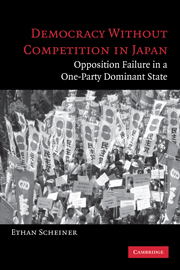Book contents
- Frontmatter
- Contents
- Tables and Figures
- Glossary of Abbreviations
- Acknowledgments and a Note on the Use of the Online Appendix
- Introduction: The Puzzle of Party Competition Failure in Japan
- 1 The Importance of Party Competition and a Model of Party Competition Failure
- 2 Opposition Failure in Japan: Background and Explanations
- 3 Clientelism and Its Determinants
- 4 The Impact of Clientelism and Centralized Government Financial Structure: Comparative Analysis
- 5 Local Opposition Failure in Japan
- 6 National-Level Opposition Failure: The Impact of Subnational-Level Weakness
- 7 Political Economy Changes and Their Impact on Party Systems: Comparative Analysis
- 8 Parallel Party Systems: Political Economy Changes and the Limits to Anti-Clientelist Appeals in Japan
- 9 The Problem of Organization and Coherence in Top-Down Party Formation
- 10 Conclusion: Democracy Without Competition
- References
- Index
3 - Clientelism and Its Determinants
Published online by Cambridge University Press: 02 December 2009
- Frontmatter
- Contents
- Tables and Figures
- Glossary of Abbreviations
- Acknowledgments and a Note on the Use of the Online Appendix
- Introduction: The Puzzle of Party Competition Failure in Japan
- 1 The Importance of Party Competition and a Model of Party Competition Failure
- 2 Opposition Failure in Japan: Background and Explanations
- 3 Clientelism and Its Determinants
- 4 The Impact of Clientelism and Centralized Government Financial Structure: Comparative Analysis
- 5 Local Opposition Failure in Japan
- 6 National-Level Opposition Failure: The Impact of Subnational-Level Weakness
- 7 Political Economy Changes and Their Impact on Party Systems: Comparative Analysis
- 8 Parallel Party Systems: Political Economy Changes and the Limits to Anti-Clientelist Appeals in Japan
- 9 The Problem of Organization and Coherence in Top-Down Party Formation
- 10 Conclusion: Democracy Without Competition
- References
- Index
Summary
Clientelism refers to the exchange of benefits (by the government, parties, and/or politicians) for voter or organization support. Clientelist benefits are those awarded to people who support a specific party or candidate and withheld from those who do not (Chapter 1). Clientelism plays front and center in the Japanese political system, and clientelism lies at the core of Japanese opposition failure.
In Japan, clientelist mechanisms work through organizations and (especially local) politicians who are able to deliver a substantial number of votes to the ruling LDP. This “organized vote” is achieved by the party monitoring and enforcing a number of exchange practices that are often attributed to the electoral system. Japan's long-used and derided single nontransferable vote in multimember district electoral system is utilized by a very small number of polities. Nevertheless, it has received a large amount of attention, in part because of its perceived effect on clientelism.
In Japan, SNTV/MMD certainly played an important role in reinforcing clientelist linkages, but, as I explain in this chapter, clientelism was originally a result of other factors, especially the internal mobilization of the country's first parties and the organization of (especially rural) landholding. In the postwar era, SNTV/MMD contributed substantially to new political arrangements that held clientelism at their core, but electoral system arguments are not sufficient to explain Japanese clientelism. The electoral system was utilized throughout the country, but the levels of clientelism varied widely, according to social structure, local financial dependence on the central government, and political economy.
- Type
- Chapter
- Information
- Democracy without Competition in JapanOpposition Failure in a One-Party Dominant State, pp. 64 - 89Publisher: Cambridge University PressPrint publication year: 2005



